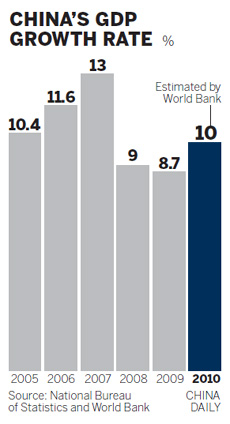GDP growth forecast to slow down

The country's GDP growth rate will slow to 8.7 percent this year from 10 percent in 2010, and a key challenge in 2011 will be to ensure that anti-inflationary measures do not "significantly" reduce growth, the World Bank said on Thursday.
The bank estimates that global GDP, which expanded by 3.9 percent in 2010, will slow to 3.3 percent in 2011, before reaching 3.6 percent in 2012. Developing countries will continue to outstrip growth in developed countries, it said.
Amid credit-tightening measures to combat inflation and surging property prices, China's growth is expected to ease to 8.4 percent in 2012, the bank said.
Despite the slowdown, China will spearhead Asia's economic expansion. According to the bank's forecast, the overall growth rate for developing Asian economies will ease to 8 percent from last year's 9.3 percent as governments rein in credit to cool inflationary pressures.
"For China, a big concern is how to ensure a soft landing of the economy without significantly reducing growth when the government takes measures to curb inflation," said Hans Timmer, director of development prospects at the World Bank.
The consumer price index (CPI), a main gauge of inflation, accelerated to a 28-month high of 5.1 percent in November from a year earlier and most economists predict that it will be in the region of 4 to 4.5 percent this year.
In a bid to combat inflation, the central bank hiked interest rates by 25 basis points twice in the last quarter of 2010.
Ardo Hansson, lead economist of the World Bank's Beijing Office, said the country needs more flexibility in its foreign exchange policy to fight inflation.
China's central bank set the yuan's mid-point beyond 6.60 against the US dollar for the first time on Thursday, breaching an important barrier just days before President Hu Jintao's visit to the United States next week.
The People's Bank of China set the mid-point, from which the currency can rise or fall 0.5 percent on a given day, for daily trading against the dollar at 6.5997, the first time it had broken through 6.60.
The yuan has risen around 3.6 percent since June when authorities dropped a peg with the US dollar that had been set to support the economy during the global financial crisis.
Some US politicians have been pressing China to allow the currency to rise at a faster pace to help narrow a trade gap.
US Treasury Secretary Timothy Geithner repeated his call on Wednesday for a faster appreciation of the yuan and added that such a move could lead to an easing of restrictions on US technology exports to China, with both civilian and military use.
"The recent quickened pace of yuan appreciation could be considered as a gesture by the Chinese government before Hu's visit to the US," said Dong Xian'an, chief macroeconomic analyst with Industrial Securities.
According to Dong, the yuan will appreciate by 5 to 6.6 percent this year, "a moderate pace".
Wang Tao, chief China economist at UBS Securities, said they expected the currency to grow by 5 percent in 2011.
The yuan can now be increasingly used in cross-border transactions, in a bid to reduce dependence on the US dollar after Premier Wen Jiabao said in March that he was "worried" about holdings of dollar-denominated assets.
The central bank is allowing banks and enterprises in areas that carry yuan-settled trade to use yuan-denominated investment overseas directly, it said in a statement on its website on Thursday, describing the initiative as a pilot program.
According to data from HSBC, the average monthly volume of yuan-settled trade surged from 0.6 billion yuan ($90 million) in 2009 to 68 billion yuan between June and November 2010. And one-third of China's cross-border trade may be settled in yuan by 2016, as the government pushes for the internationalization of the currency.
 0
0 






